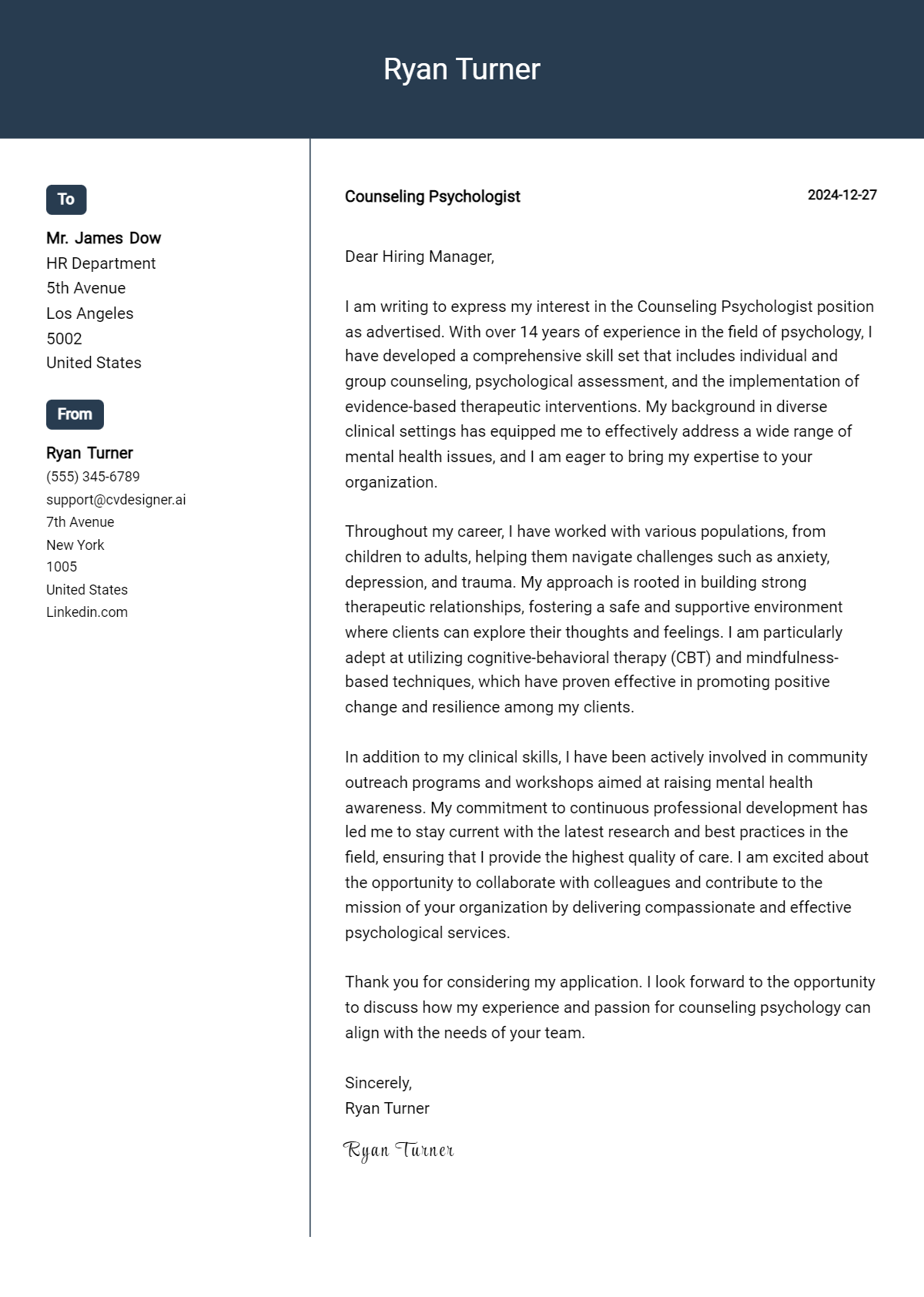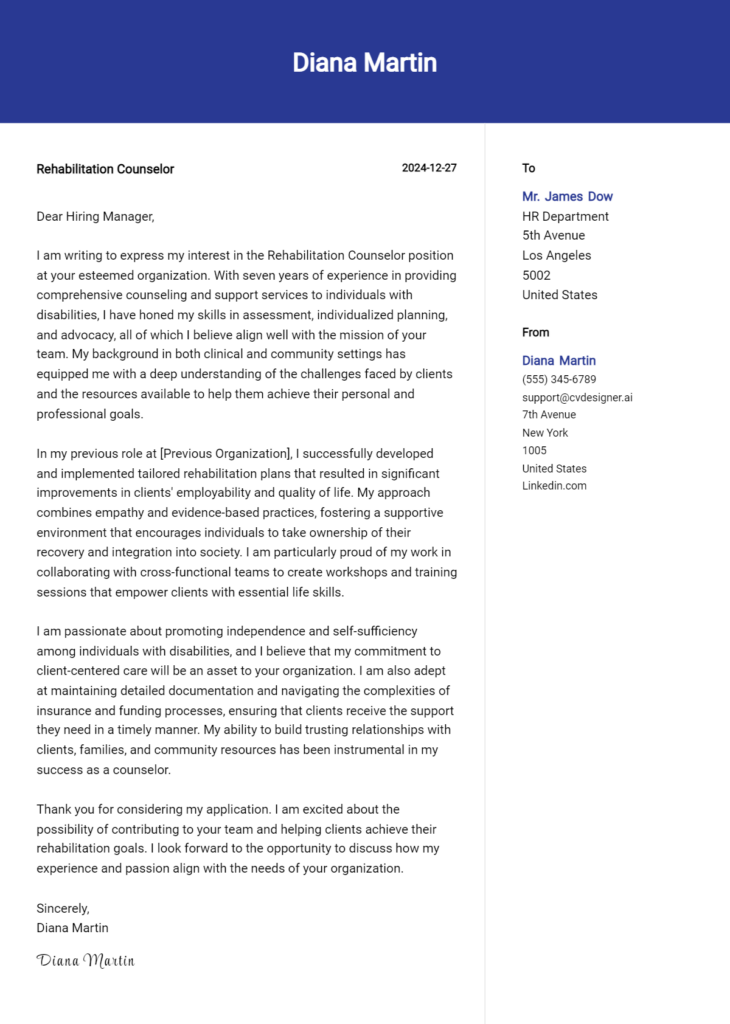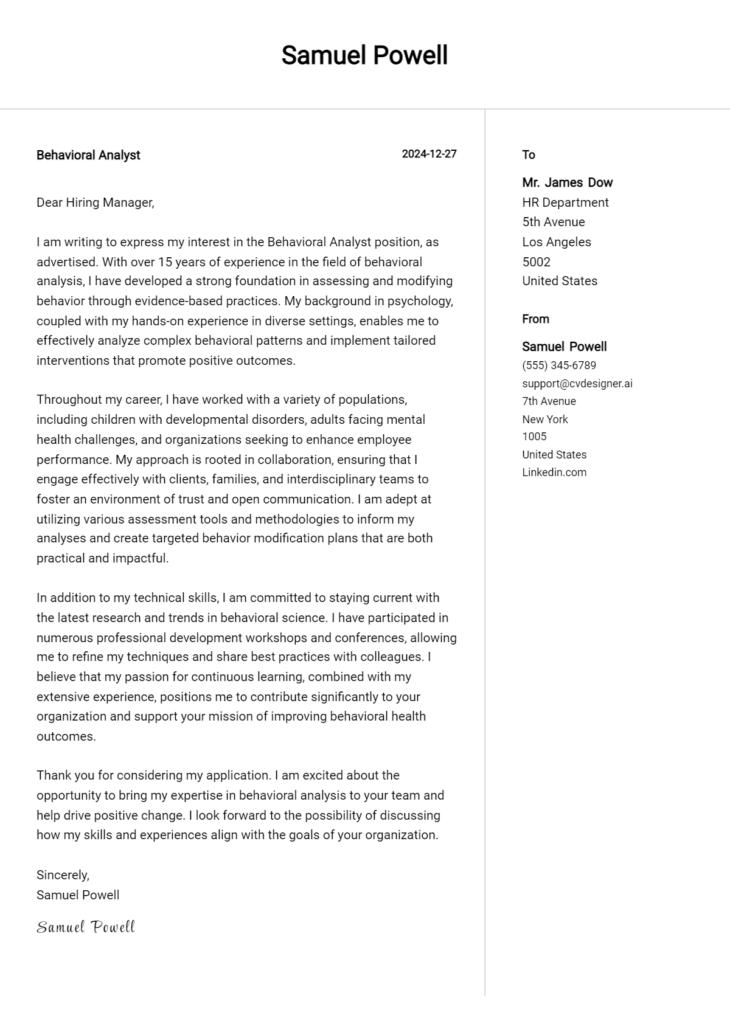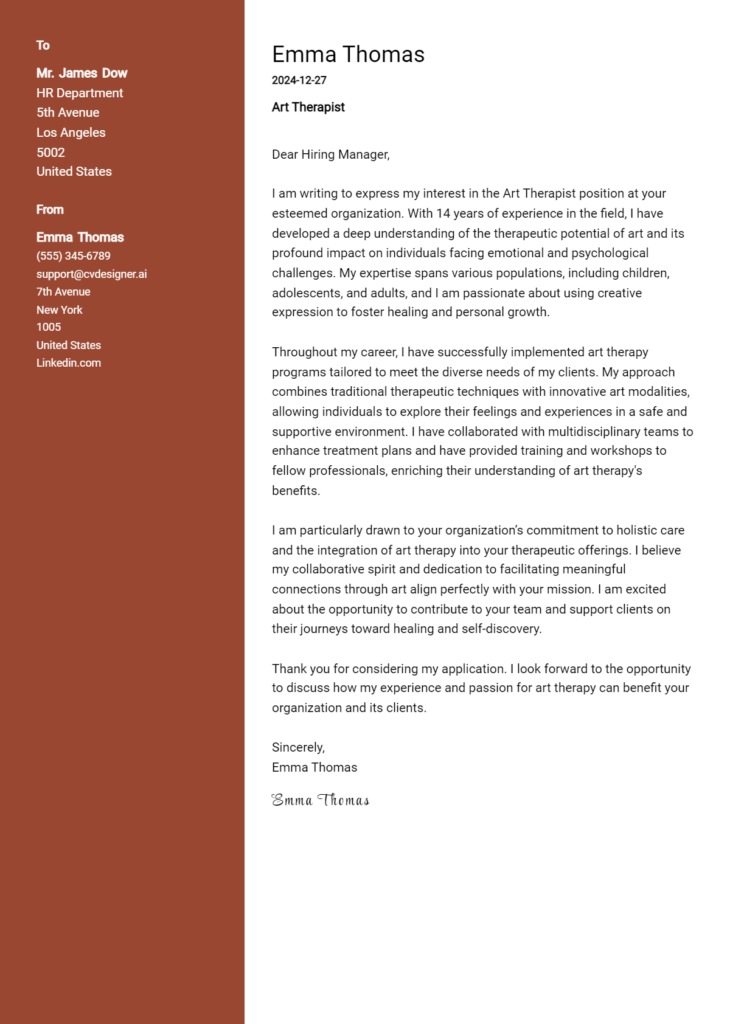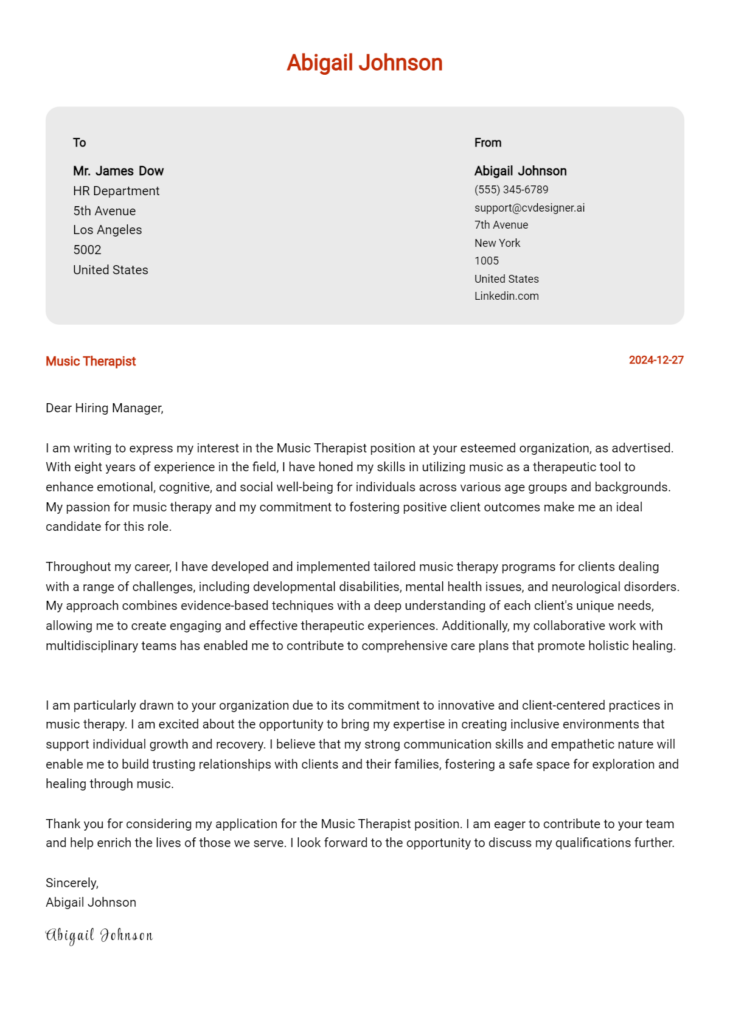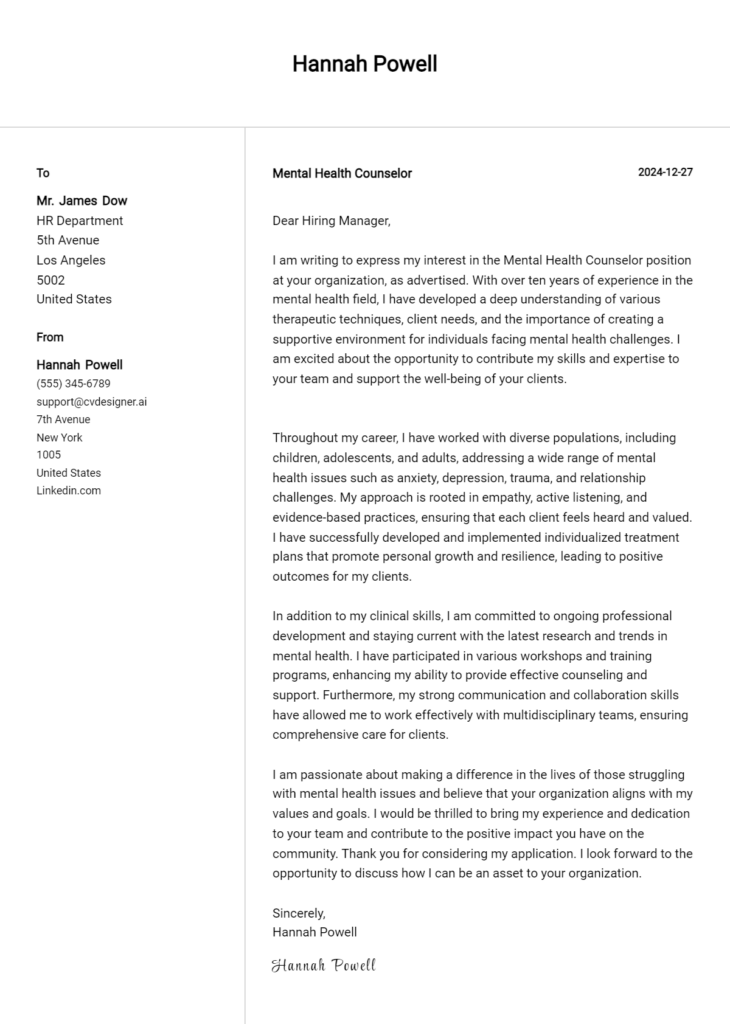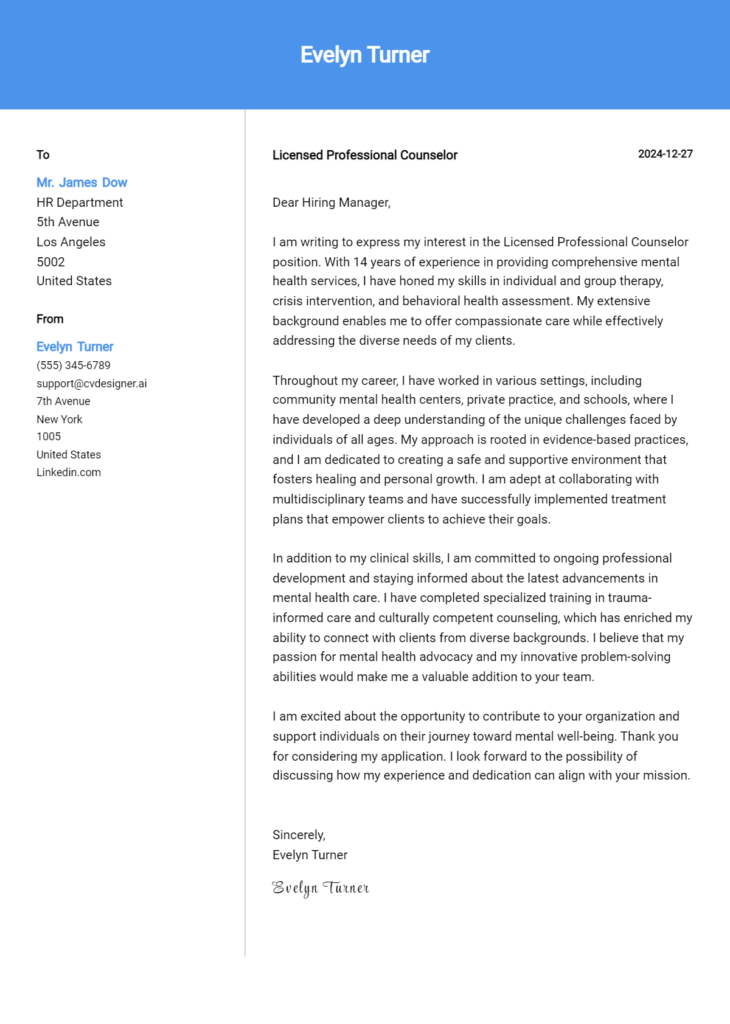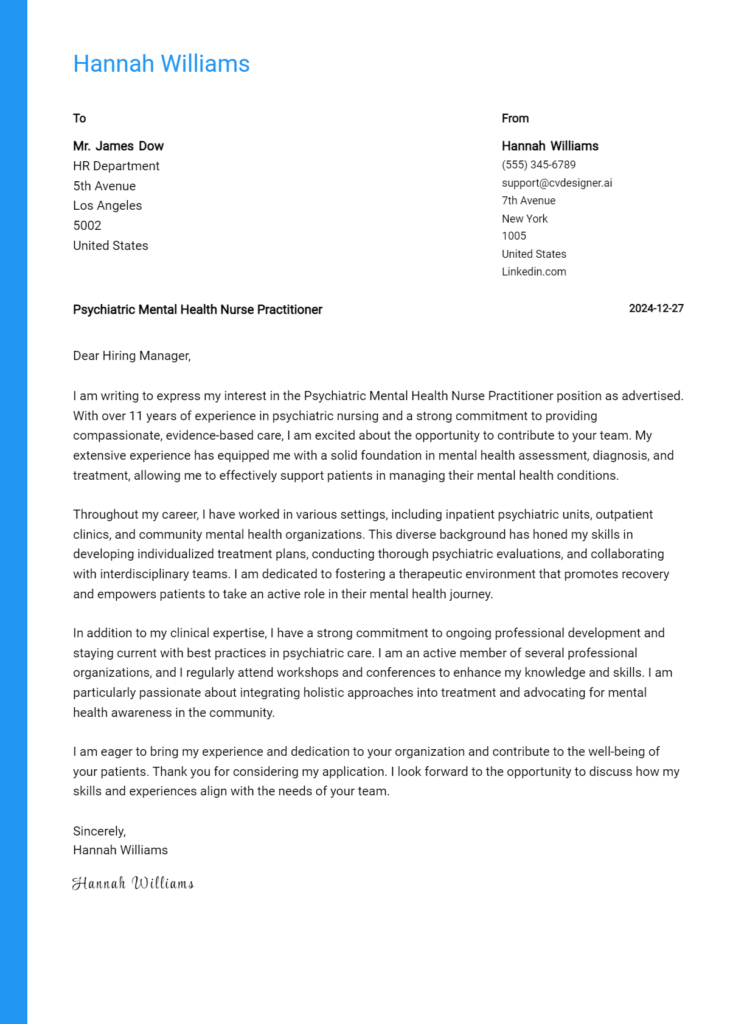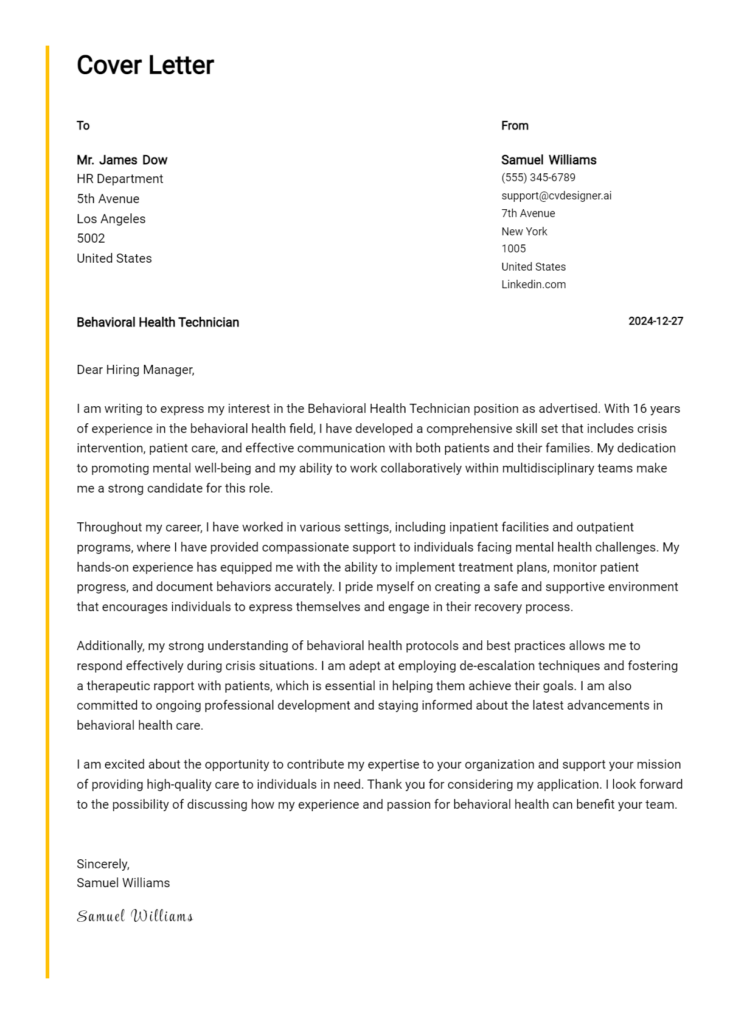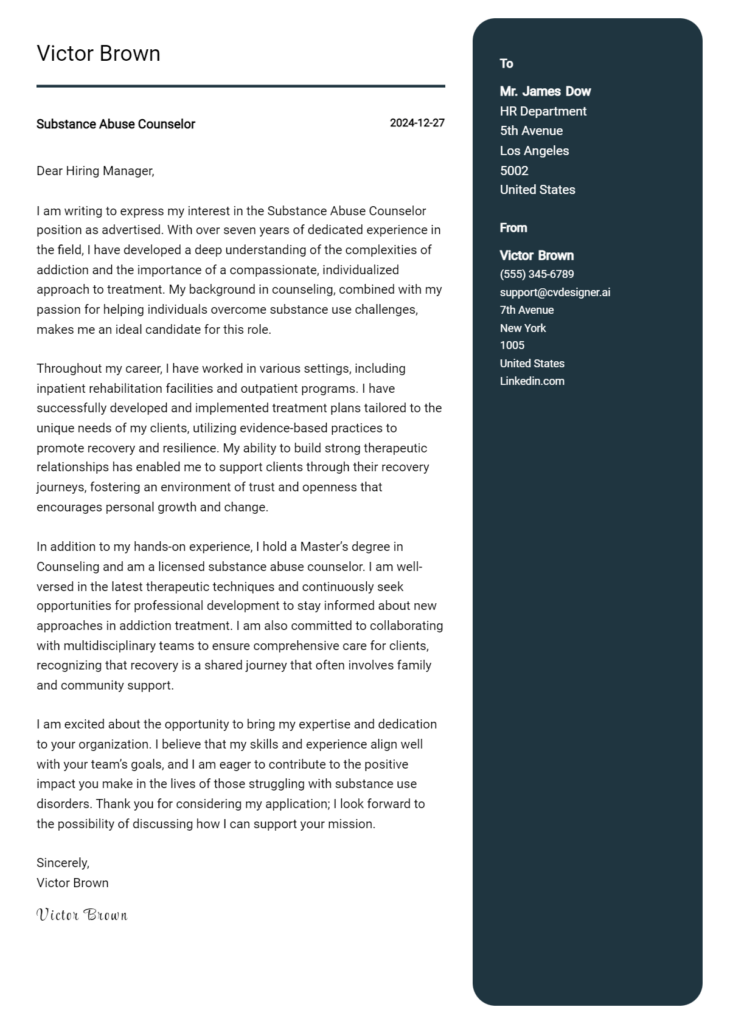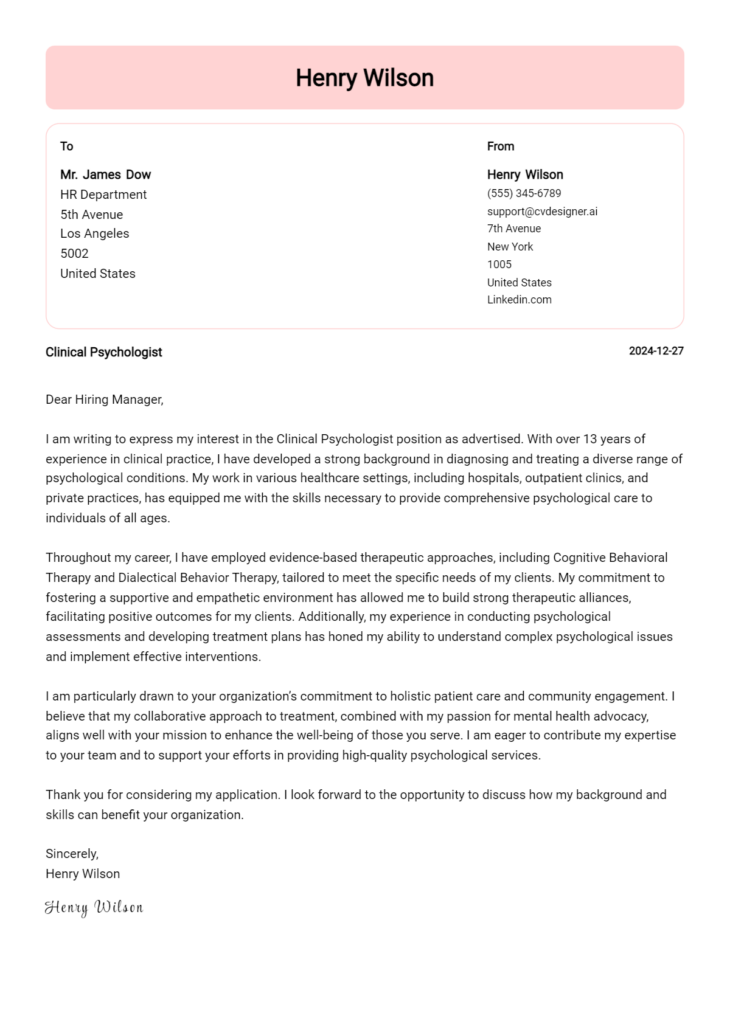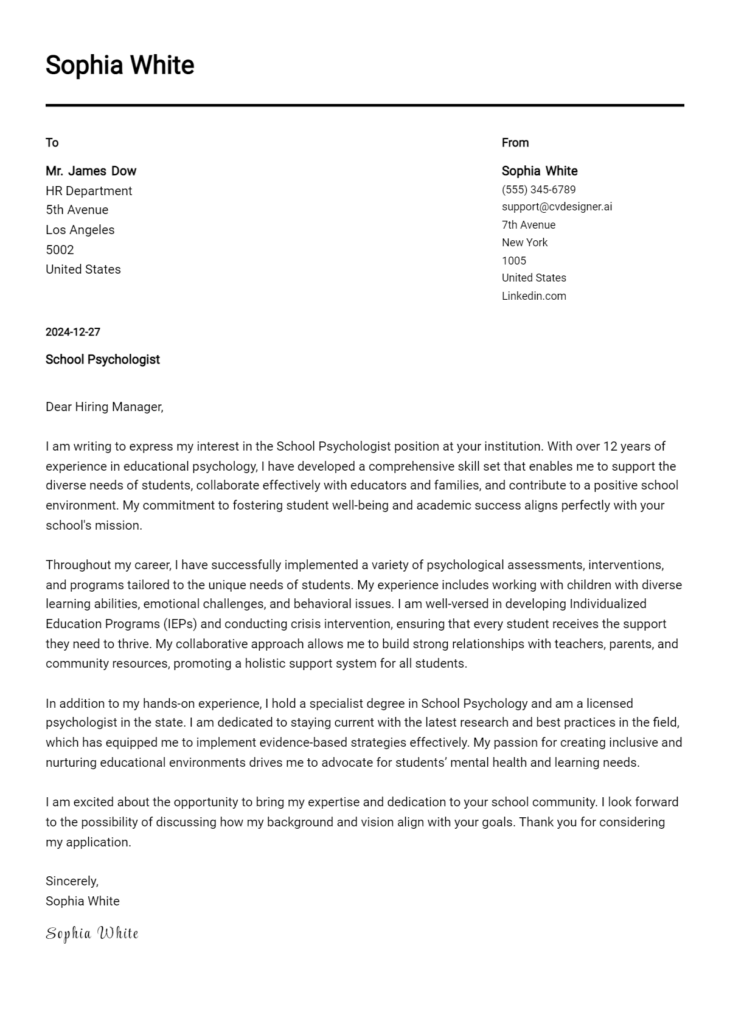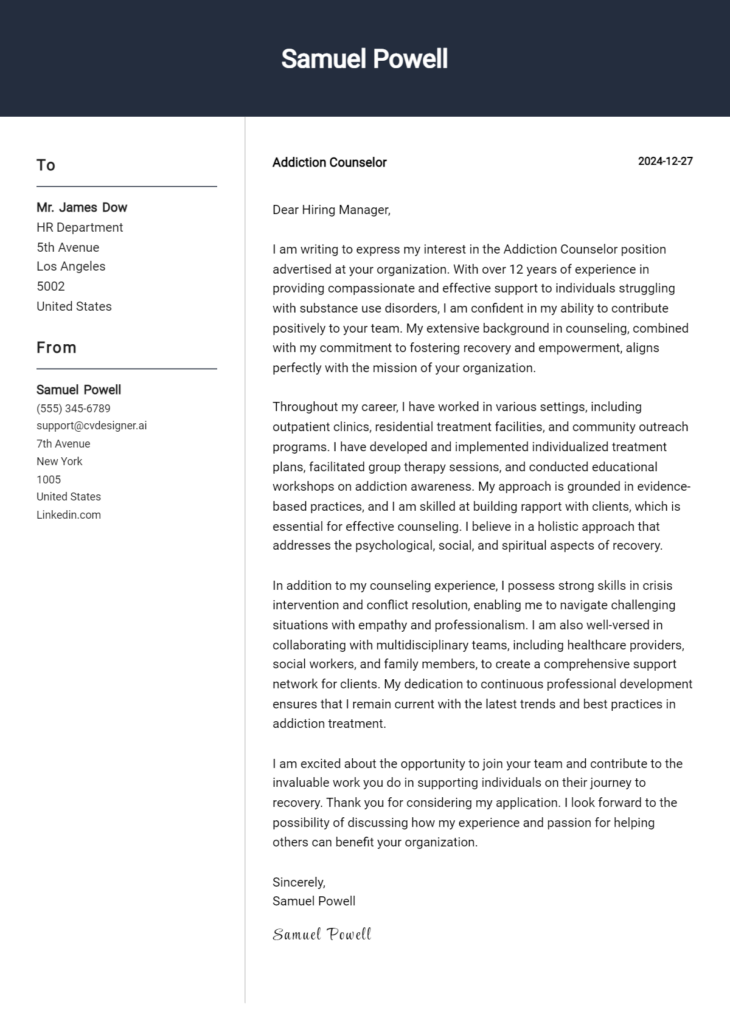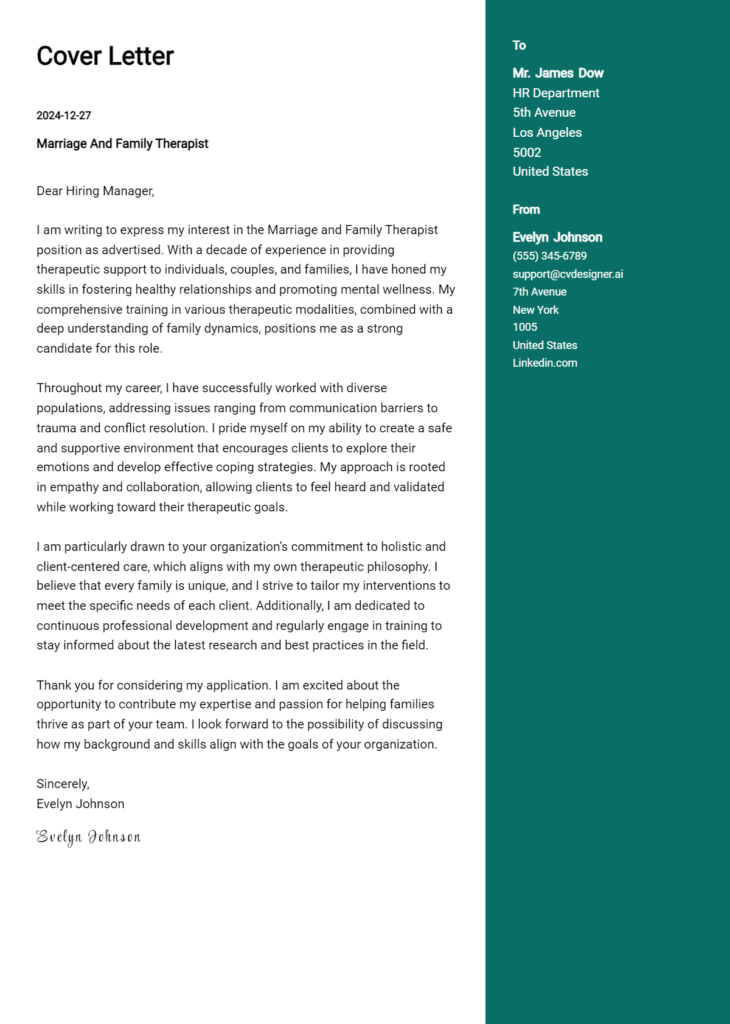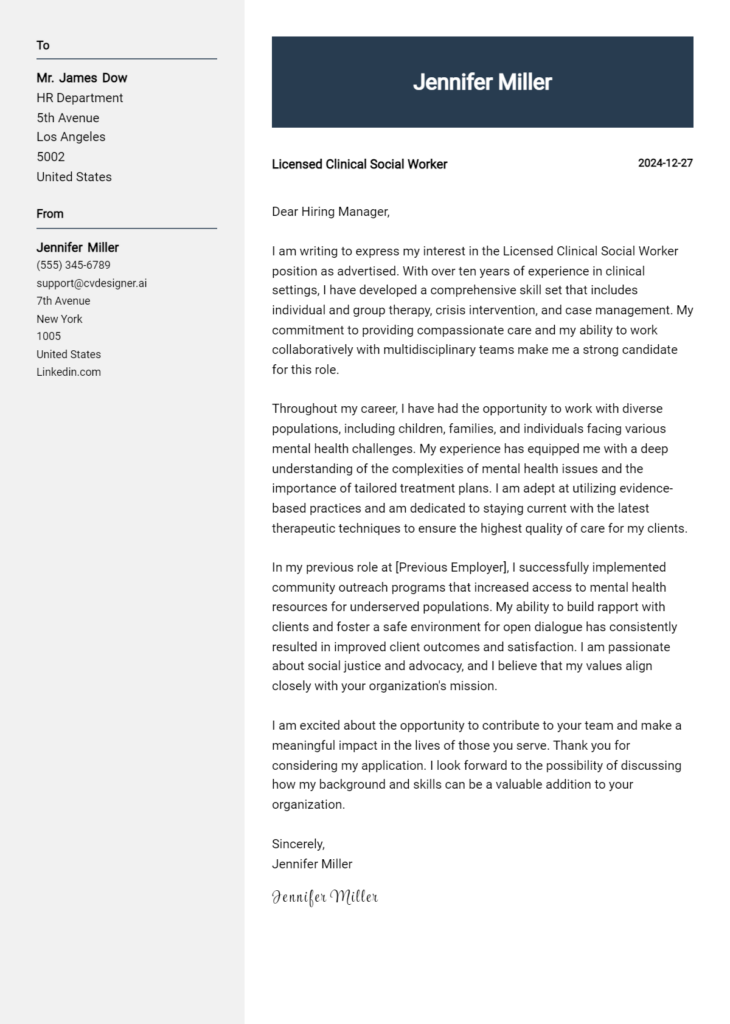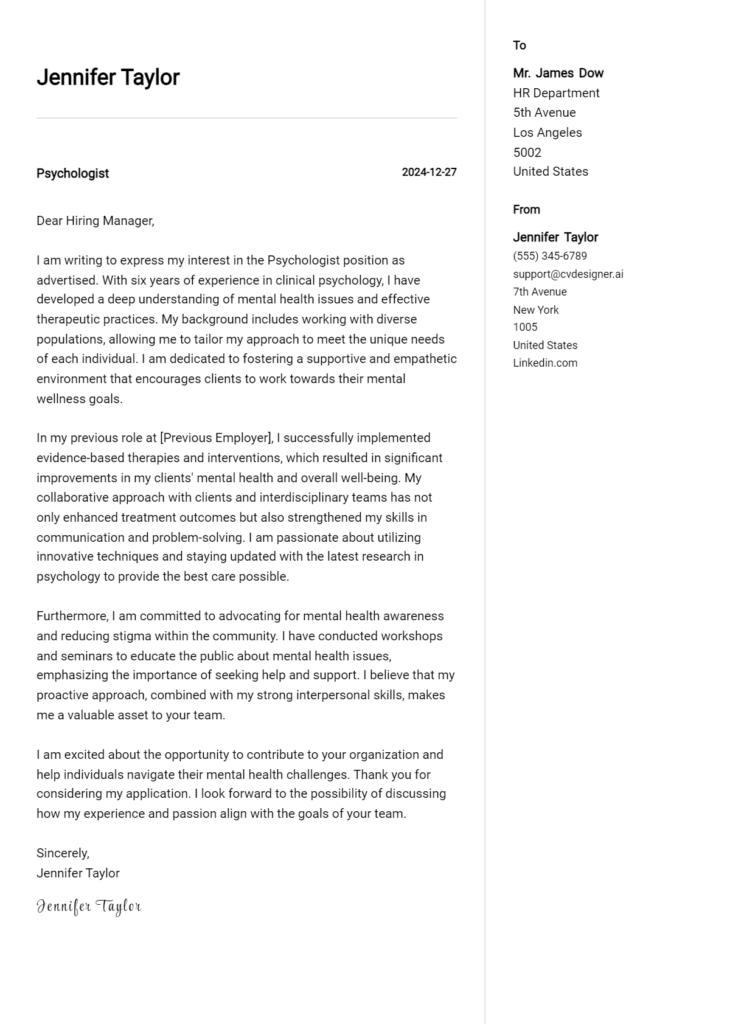Counseling Psychologist Cover Letter Examples
Explore additional Counseling Psychologist cover letter samples and guides and see what works for your level of experience or role.
How to Format a Counseling Psychologist Cover Letter?
Creating a well-structured cover letter is essential for a Counseling Psychologist, as it serves as a first impression for potential employers. A thoughtfully formatted letter not only highlights your qualifications but also emphasizes your ability to communicate effectively and empathetically—traits that are critical in the field of psychology. The way you present your experiences and skills can demonstrate your understanding of client needs and your professional demeanor, both of which are vital in establishing trust with clients and colleagues.
In this guide, we will outline how to structure your cover letter, providing insights and examples tailored for Counseling Psychologists to help you craft an impressive document.
We will focus on the key components of a professional cover letter, including:
- Cover Letter Header
- Cover Letter Greeting
- Cover Letter Introduction
- Cover Letter Body
- Cover Letter Closing
Each section plays a crucial role in showcasing your qualifications and professionalism. Let’s explore each part and discuss how to make your Counseling Psychologist cover letter truly stand out.
The Importance of a Cover Letter Header for a Counseling Psychologist
The header of a cover letter is crucial for establishing a professional tone and ensuring clarity right from the start. It serves as the first impression for potential employers and provides essential details such as your contact information, the date, and the recipient’s information. A well-structured header not only conveys professionalism but also makes it easy for hiring managers to identify and contact you. It is important to format this section clearly to reflect your attention to detail, a vital trait for a counseling psychologist.
In crafting your header, include your name, phone number, email address, the date, and the recipient's name and title, along with their organization's name and address. This information should be organized neatly to enhance readability.
Strong Example:
Jane Doe 1234 Maple Street Anytown, ST 12345 (123) 456-7890 jane.doe@email.com October 15, 2023 Dr. John Smith Human Resources Director XYZ Counseling Center 5678 Oak Avenue Anytown, ST 12345
Weak Example:
Jane jane.doe@email.com 10/15/23 XYZ Counseling Center
The Importance of a Thoughtful Greeting in Your Cover Letter
The greeting of your cover letter serves as the first impression to the hiring manager and sets the tone for the rest of your application. A well-crafted greeting demonstrates professionalism and shows that you have taken the time to personalize your letter, which can be particularly important in a field like counseling psychology where interpersonal skills are paramount. Addressing the hiring manager directly not only fosters a connection but also reflects your attention to detail. To avoid generic greetings that could make your application blend in with others, take the time to research the recipient's name, which can often be found on the company's website or in the job listing.
Strong Greeting Example
Dear Dr. Smith,
Weak Greeting Example
To Whom It May Concern,
By choosing a strong greeting, you establish a more engaging tone and demonstrate your enthusiasm for the position, setting the stage for a compelling cover letter that reflects your qualifications and passion for counseling psychology.
The Importance of a Compelling Cover Letter Introduction for a Counseling Psychologist
A well-crafted cover letter introduction is crucial for a Counseling Psychologist as it serves as the first impression to the hiring manager. This introduction should not only capture the reader's attention but also express the candidate’s genuine interest in the role while succinctly showcasing key skills or notable achievements relevant to the position. A strong opening can set the tone for the rest of the letter, demonstrating the candidate’s qualifications and passion for helping others, which is essential in the field of counseling psychology. Conversely, a weak introduction may fail to engage the reader and could lead to the application being overlooked. Below are examples of strong and weak cover letter introductions for a Counseling Psychologist.
Strong Example:
Dear [Hiring Manager's Name], As a dedicated and empathetic Counseling Psychologist with over five years of clinical experience in diverse settings, I am excited about the opportunity to contribute to [Company/Organization Name]. My passion for fostering mental wellness and my proven track record of developing effective therapeutic interventions have equipped me with the skills to make a meaningful impact on your team. I am particularly drawn to this position due to [specific reason related to the organization or role], and I am eager to bring my expertise in cognitive behavioral therapy and client-centered counseling to your esteemed practice.
Weak Example:
To Whom It May Concern, I am applying for the Counseling Psychologist position. I have some experience in psychology and think I would be a good fit for the job. I have worked with clients before and I hope to help people improve their mental health.
Purpose of the Cover Letter Body for a Counseling Psychologist
The cover letter body for a Counseling Psychologist serves as a critical component that allows candidates to showcase their unique skills, experiences, and the value they can bring to the organization. This section should highlight specific projects or accomplishments that demonstrate the candidate's expertise in psychological assessment, intervention strategies, and therapeutic techniques. By providing concrete examples of past successes, such as improving client outcomes through innovative therapy methods or leading community mental health initiatives, the candidate can effectively illustrate their qualifications and commitment to the field. A well-crafted cover letter body not only reflects the candidate's professional journey but also connects their individual experience to the goals of the organization, making a compelling case for their candidacy.
Strong Example
In my previous role as a Counseling Psychologist at XYZ Clinic, I spearheaded a project that integrated mindfulness-based therapy techniques into our existing treatment programs. This initiative resulted in a 30% improvement in client satisfaction ratings and a 20% decrease in reported anxiety symptoms among participants. Additionally, I collaborated with a multidisciplinary team to develop a community outreach program that provided mental health resources to underprivileged populations, positively impacting over 200 individuals in the first year alone. These experiences have honed my ability to design effective therapeutic interventions and foster a supportive therapeutic environment, aligning perfectly with your organization's mission to enhance mental wellness in the community.
Weak Example
I have worked as a Counseling Psychologist for several years and have done some projects. I think I would be a good fit for your organization because I like helping people. I have experience in therapy and have helped some clients. I also attended a few workshops on mental health. I am confident that I can contribute to your team.
Importance of the Cover Letter Closing for a Counseling Psychologist
The closing paragraph of a cover letter is crucial for a Counseling Psychologist as it serves to summarize qualifications, reiterate enthusiasm for the role, and encourage the hiring manager to take the next steps, such as reviewing the resume or scheduling an interview. A strong closing not only reinforces the candidate's fit for the position but also leaves a positive and lasting impression. Conversely, a weak closing may fail to convey confidence or interest, potentially diminishing the overall impact of the application.
Strong Example
Thank you for considering my application for the Counseling Psychologist position at [Company Name]. With my extensive experience in cognitive behavioral therapy and my passion for supporting individuals through their mental health journeys, I am excited about the opportunity to contribute to your team. I look forward to discussing how my skills align with your needs and would be happy to provide any further information. Please feel free to contact me to schedule an interview at your convenience. Thank you for your time and consideration.
Weak Example
So, that's it. I guess I’m done now. If you want to look at my resume, you can. I hope you think about my application and maybe call me sometime. Thanks, I guess.
These tips will guide candidates in crafting an effective cover letter for a Counseling Psychologist position. A well-written cover letter is essential, as it allows you to showcase not only your technical skills and problem-solving abilities but also your knowledge of the software development life cycle (SDLC), teamwork experience, and your passion for continuous learning. By highlighting these areas, you can demonstrate your readiness to contribute effectively to a clinical setting.
Tips for Writing an Effective Cover Letter
Highlight Relevant Technical Skills
When applying for a Counseling Psychologist position, it’s crucial to emphasize your technical skills, such as familiarity with assessment tools, therapeutic techniques, and software used in clinical settings. Mention specific tools or programs you are proficient in, and how they enhance your practice. This not only shows your qualifications but also your commitment to utilizing technology to improve client outcomes.Demonstrate Problem-Solving Abilities
Counseling often involves navigating complex emotional and psychological issues. Use your cover letter to present examples of how you have effectively solved problems in previous roles. Whether it was developing new strategies for client engagement or finding innovative ways to address challenging cases, showcasing these experiences will demonstrate your critical thinking and adaptability.Showcase Your Knowledge of SDLC
While the Software Development Life Cycle (SDLC) might not seem directly related to counseling, understanding how to implement systematic approaches to therapy can be beneficial. Discuss any experience you have with data collection, assessment, or program evaluation that aligns with SDLC principles. This can illustrate your ability to approach client care methodically and effectively.Emphasize Teamwork and Collaborative Skills
Counseling often involves working within a multidisciplinary team. Highlight your experience collaborating with other professionals, such as social workers, psychiatrists, or educators, to create comprehensive treatment plans. Providing examples of successful teamwork will strengthen your candidacy and show your ability to contribute to a positive work environment.Express a Passion for Continuous Learning
The field of psychology is ever-evolving, and your commitment to professional development is vital. Mention any ongoing education, workshops, or certifications you are pursuing or have completed. This demonstrates your dedication to staying current with best practices and improving your skills, which is essential for providing high-quality care to clients.
For additional resources, consider utilizing cover letter templates to format your letter effectively or a cover letter builder to streamline the writing process.
Common Mistakes to Avoid in a Counseling Psychologist Cover Letter
Crafting a compelling cover letter is essential for standing out in the competitive field of counseling psychology. Avoiding common mistakes can significantly enhance your chances of making a positive impression. Here are some frequent pitfalls to watch out for:
Generic Greetings: Using a generic greeting like "To Whom It May Concern" can make your cover letter feel impersonal. Always try to address it to a specific person, if possible.
Repetition of the Resume: Your cover letter should complement your resume, not repeat it. Instead of restating your qualifications, highlight specific experiences and skills that showcase your fit for the role.
Lack of Personalization: Failing to tailor your letter to the specific job or organization can signal a lack of genuine interest. Research the employer and incorporate relevant details to demonstrate your enthusiasm.
Ignoring the Job Description: Not referencing key qualifications or competencies mentioned in the job posting can lead to missed opportunities. Use the job description as a guide to align your skills with the employer's needs.
Poor Formatting: A cover letter that is difficult to read due to poor formatting can quickly lose the reader's attention. Ensure that your letter follows a professional cover letter format and is visually appealing.
Neglecting Proofreading: Typos and grammatical errors can undermine your professionalism. Take the time to proofread your letter or have someone else review it.
Overly Lengthy Content: A cover letter should be concise and to the point, ideally one page long. Avoid unnecessary details that can distract from your main message.
By steering clear of these mistakes and following some effective cover letter examples, you can create a strong cover letter that showcases your qualifications and passion for the role.
Cover Letter FAQs for Counseling Psychologist
What should I include in my cover letter as a Counseling Psychologist?
When writing your cover letter, include your professional qualifications, relevant experience, and a brief overview of your counseling approach. Start with a strong introduction that states the position you are applying for and how you learned about it. Highlight your educational background, such as your degree in psychology and any specialized training or certifications. Discuss your experience in providing counseling services, including specific populations you have worked with (e.g., children, couples, or trauma survivors). Finally, articulate your therapeutic philosophy or modalities you utilize, and express your enthusiasm for contributing to the organization’s mission.
How can I tailor my cover letter to a specific position?
To tailor your cover letter, research the organization and understand its values, mission, and the specific needs of the community it serves. Use this information to align your skills and experiences with the job description. Incorporate specific examples of past work that relate directly to the responsibilities mentioned in the job posting. For instance, if the position emphasizes community outreach, describe a relevant project where you successfully engaged with the community. Personalizing your cover letter demonstrates your genuine interest in the role and shows that you are proactive in understanding the organization’s objectives.
What tone should I use in my cover letter?
The tone of your cover letter should be professional yet approachable. As a Counseling Psychologist, it’s essential to convey empathy and understanding while maintaining a level of professionalism. Use clear and concise language to express your thoughts. Avoid jargon unless it directly relates to the position. A warm and conversational tone can reflect your interpersonal skills, which are crucial in counseling. However, ensure that your tone remains respectful and formal, particularly in the opening and closing statements. This balance will help you connect with the reader while showcasing your professionalism.
How long should my cover letter be?
Your cover letter should typically be one page long, consisting of three to four paragraphs. Aim for about 300 to 400 words to ensure you provide enough detail without overwhelming the reader. Start with a compelling introduction, followed by a paragraph outlining your qualifications and relevant experience. A third paragraph can describe specific skills or accomplishments that make you an ideal candidate for the role. Finally, conclude with a brief summary of your enthusiasm for the position and a call to action, such as expressing your desire for an interview. Keeping it concise and focused will make a stronger impact on hiring managers.
Build your Cover Letter in minutes
Use an AI-powered cover letter builder and have your letter done in 5 minutes. Just select your template and our software will guide you through the process.

